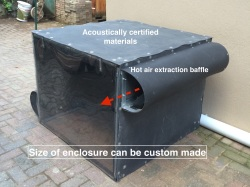Excessive noise within and around the home environment is an issue for many homeowners, and the problem seems to be increasing rapidly.
 No longer are the complaints of noisy neighbours and proximity to busy roads the only issues. Thanks to the ineffectiveness of our electricity supplier, the steady hum of generators has slowly but surely added to the noise pollution in our suburbs.
No longer are the complaints of noisy neighbours and proximity to busy roads the only issues. Thanks to the ineffectiveness of our electricity supplier, the steady hum of generators has slowly but surely added to the noise pollution in our suburbs.No longer are the complaints of noisy neighbours and proximity to busy roads the only issues. Thanks to the ineffectiveness of our electricity supplier, the steady hum of generators has slowly but surely added to the noise pollution in our suburbs.
As a result, the number of noise complaints has gone up, leading to municipalities all over South Africa ‘waking up’ to the need to police this increasingly persistent invasion of our peace.
So what can exasperated homeowners do to avoid fines or even prosecution?
Well, having already spent a large chunk of their hard-earned cash on a generator, homeowners then often look to soundproof this problem on the cheap, using age-old urban myths like polystyrene or egg boxes.
Using either of these products to soundproof anything, let alone a 97dB diesel generator, is tantamount to using a band-aid to fix a crack in your windscreen - it looks ugly and it just won’t work.
In some areas, municipalities have already started issuing cease notices on generators or have slapped homeowners with fines.
 In some areas, municipalities have already started issuing cease notices on generators or have slapped homeowners with fines.
In some areas, municipalities have already started issuing cease notices on generators or have slapped homeowners with fines.Apart from the legal issue, no one wants to be the bad guy by causing awkward vibes between neighbours. It is therefore more critical than ever to ensure that noise issues within the home are reduced, or even better, removed.
Genesisacoustics shares how homeowners can block out generator noise…
1. LF125 acoustic panels
Able to dampen over 70% of noise at 125 Hz and up to 100% from 250 Hz and upwards because of their density and structure, LF125 panels prevent your generator enclosure from becoming a ‘boom box’.
Highly effective at absorbing sound, these panels are flexible and can be used on flat or slightly curved surfaces for acoustic insulation. Furthermore, they are biologically inert, unaffected by vermin and do not encourage the growth of fungi, mould or bacteria.
The panels are also non-combustible, meaning they are safe to use in virtually any environment.
2. Flexible noise barrier
 The components in the Flexible Noise Barrier STC 26 make up the sound deadening materials in the pre-fabricated soundproof enclosure, which is able to drop the noise at one metre by approximately 30dB.
The components in the Flexible Noise Barrier STC 26 make up the sound deadening materials in the pre-fabricated soundproof enclosure, which is able to drop the noise at one metre by approximately 30dB.The Flexible Noise Barrier is a non-reinforced, loaded vinyl barrier that is designed to reduce the transmission of noise through walls, ceilings and floors. It is also used as a noise barrier component in acoustical composites.
It is limp, flexible, formable and versatile, with high tear and tensile strength, which makes it easy to install and easy to cut to size with a sharp blade.
Furthermore, the Flexible Noise Barrier has a clear version and can be used effectively across windows to reduce the sound transmission from passing traffic and so on.
3. Pre-fabricated soundproof enclosure
The components in the Flexible Noise Barrier STC 26 make up the sound deadening materials in the pre-fabricated soundproof enclosure, which is able to drop the noise at one metre by approximately 30dB.
At seven metres away, there is a further drop-off that reduces the noise of the generator to below the ambient noise in the neighbourhood, but more importantly to under the municipal stipulation.
Additional soundproofing tips
 Acoustic panels can be upholstered with either a plain colour fabric, a full colour print or high resolution photo of your choice.
Acoustic panels can be upholstered with either a plain colour fabric, a full colour print or high resolution photo of your choice.Aside from the issues mentioned above, there are several other noise pollution problems in the home that one may need to address like using the correct underlay for hard floor finishes, shared walls in flats and townhouse complexes or acoustically treating music or cinema rooms for reverberation and noise break out.
Acoustic panels can be upholstered with either a plain colour fabric, a full colour print or high resolution photo of your choice.
The panels effectively reduce reverberation in areas where aesthetics are an important element. Available thickness starts at a slim 25mm profile up to 60mm.
The excellent sound damping properties of these panels means that they are suitable for bedrooms, entrance halls and lounges.
Another key area where sound can enter or escape is through the ceiling. With a noise reduction coefficient of 0.95 to 1.0 (1.0 being the maximum achievable), acoustic insulation is a non-flammable product which is perfect to reduce or nullify the sound travelling through the ceiling.
Offering a thickness of 75mm, the best results, however, are achieved when doubling this to 150mm.
Acoustic insulation should be laid over the ceiling where it forms an essential part of the soundproofing of the ceiling structure. A double layer (150mm thick) will offer far better attenuation in the problematic low frequency range, from which most noise complaints arise. It can also be used in conjunction with acoustic boards, flexible noise barrier, and green glue soundproofing compound and sealant.
While the problems are varied and sometimes complicated, there is a soundproofing solution for every type of noise issue that will give homeowners peace of mind.
For more information, visit the website.








